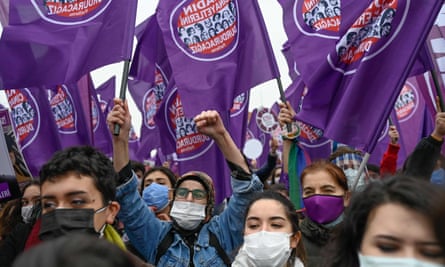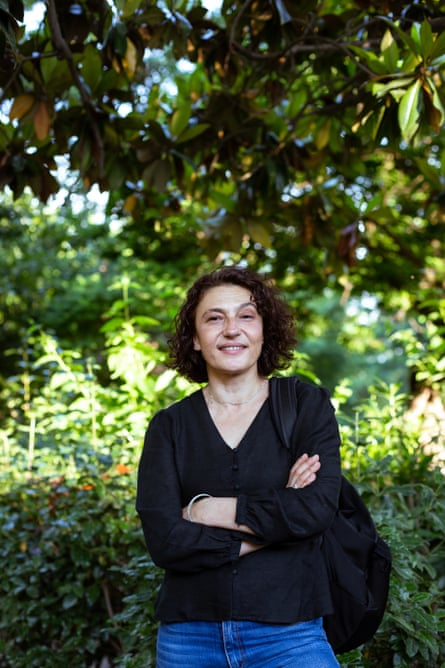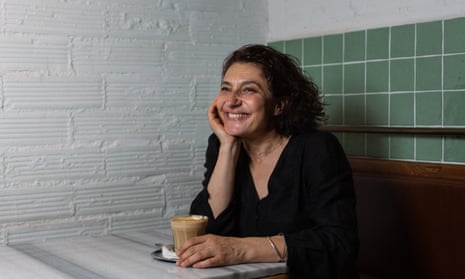“History is on our side,” says Gülsüm Kav. She leans in and speaks intensely. She has a lot to say: Kav helped create Turkey’s We Will Stop Femicide (WWSF) group, and has become one of the country’s leading feminist activists even as the political environment has grown more hostile.
Amid protests, Turkey withdrew from the Istanbul convention, the landmark international treaty to prevent violence against women and promote equality, on Thursday. The Turkish president, Recep Tayyip Erdoğan, has long attacked women’s rights and gender equality, suggesting that feminists “reject the concept of motherhood”, speaking out against abortion and even caesarean sections, and claiming that gender equality is “against nature”.
If Erdoğan is brash and opinionated then Kav, a doctor who lectures in medical ethics, is the opposite. “We work to destigmatise feminism,” she says of We Will Stop Femicide, which she and other members often refer to simply as “the platform”.
Kav is reluctant to say it, but removing the stigma attached to feminism has become more difficult in Turkey, with men’s rights groups and others at odds with her life’s work becoming increasingly empowered by the state. She has come to expect a hostile environment, especially online.
“We’re under some legal pressure, as the platform is affected by countrywide threats to freedom of speech. In some rare cases there might also be threats from the families of perpetrators. Like many activists, I’m sometimes subjected to problems,” she says.
Yet she shrugs off any suggestion that she may be arrested. “Not personally, but collectively there is pressure,” she says, pointing to regional members of WWSF who have been detained or fined.

The genesis of We Will Stop Femicide came from tragedy. Kav says the murder of a 17-year-old high school pupil, Münevver Karabulut, prompted the group to be founded. Karabulut was killed in 2009 by her boyfriend, Cem Garipoğlu, who subsequently went on the run for six months after Karabulut’s headless body was discovered in a rubbish bin. Istanbul’s then-police chief declared that Karabulut’s family could have prevented the murder “if they took care of their daughter”.
“She wasn’t the first,” says Kav. “But this incident showed us that femicide would only become more important in Turkey from then on. We joined forces with the Karabulut family in order to support them, to shadow them as the trial began, and then we began establishing the platform.”
Kav, along with a coalition of bereaved families, lawyers, trade unions and campaigners, began following trials of other suspected femicides. They showed up in courtrooms across Turkey to doggedly track cases in an attempt to get justice.
But the need has never let up. According to WWSF, 300 Turkish women were murdered last year, most by their partners. A further 171 were found dead in suspicious circumstances.
“When we started our work, it was with the idea of stopping femicides, but in order to do that, you first need to know the numbers,” says Kav.
“We thought the government would know, but apparently they didn’t. So we started drawing up reports from press clippings and the families of victims. We now do full reports as well as deeper analysis.”
Today the platform has grown into a vast network of activists and campaigners across Turkey. It has about 750 active members as well as others who turn out for mass street protests. Many take part in WWSF’s “female assemblies”, with specialised chapters for high school pupils or LGBTQ+ members – the latter a rebuke to Erdoğan’s ruling Justice and Development party’s (AKP) increasingly anti-gay rhetoric.
The platform also hosts online trainings on women’s legal rights, works as a pressure group to push for changes to Turkish law, and runs a hotline to support women who are in danger.
“This is the type of activity I’m most proud of: keeping women alive,” says Kav. The hotline is designed to help women in police stations report violence against them, sometimes providing an accompanying lawyer, as a way to implement Turkey’s sole law against domestic violence.

This work has got results. Turkey’s minister for the family began following up on femicide trials, and the government now uses the word “femicide”, due to the group’s work, even if campaigners say it shirks responsibility for combatting it. After a period in which WWSF were the only source of data on femicides in Turkey, the authorities also began to compile their own, although Kav emphasises that the state’s numbers routinely undercount cases.
“Of course our numbers are different,” she says. “The government doesn’t include girls who are under the age of 18 who are victims of femicide, plus they don’t count suspected murders. Our numbers are higher, so the interior ministry says we call everything femicide, but at least they publish reports now,” she adds.
Then there are the cases that become a battle, where Kav and her team have had to become amateur detectives in order to get the state to recognise the murder motive as femicide.
“There are often suspected femicides, meaning that the murder has taken place but the motives are unclear,” she says. “Then there are other types of femicide where the tragedy is concealed as a suicide,” she adds, pointing to the case of Esin Güneş, who was murdered by her husband when the 25-year-old told him she wanted a divorce. “They said she committed suicide by throwing herself on to some rocks, but we proved it was actually a murder,” says Kav.
Proving that a murder was not a suicide is no easy task. “We pressure forensic medicine experts and prosecutors; we find gaps in the incident reports. Often with certain incidents, where the victim has fallen, the court won’t even listen to phone records or collect evidence initially,” says Kav.
She has her own theories about why femicide is endemic in Turkey. “This is the most important issue for modern women in cities and who are looking for their freedom; they need to be backed up by strong policies and systems of justice,” she says.
“Maybe they want to get divorced and work; to reject domestic violence. These women are fundamentally changing what it means to be a woman in Turkey, and yet it created this crisis. Women are trying to realise themselves and male violence is suppressing it,” she says.
A quiet certainty that Turkish people are feminists, despite the state’s efforts to demonise them, motivates Kav. She points to the public outcry over Erdoğan’s decision to withdraw Turkey from the Istanbul convention. “Only 7% of Turkish people were against the convention, according to polls – the majority of society is in favour,” she says. “Even if they don’t know the content, they support it.”
Conservatives in Turkey, which signed the Istanbul convention in 2011, say it undermines the family. They also object to the principle of gender equality and non-discrimination on the grounds of sexual orientation, which they see as promoting homosexuality.
But Kav says: “Conservative women who wear the headscarf and vote for the [ruling] AKP are on our side, and there are many conservative women in our platform as well, fighting alongside us. Like I said, history is on our side.”
